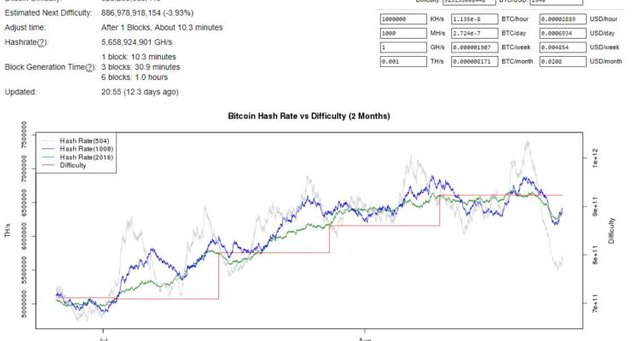
In a huge plot twist to the whole Bitcoin vs. Bitcoin Cash battle, miners have brought about a completely different angle to the debate: profitability. Ignoring everything else, the simple fact is that most miners are more interested in what is going to bring about the most profit — not what their own personal view of one currency or another is. This has created a very cyclic business side of the two Bitcoin chains.
Swapping Chains Due to Difficulty
As more miners are on a specific cryptocurrency chain, the difficulty will go up. This makes it harder to obtain coins, such that each miner's earnings will be relative to their hash rate vs. the network as a whole. In the past, this had created a lot of "multipools," where they would automatically switch over to the chains with the highest profitability. While this was usually revolving around things like the Scrypt, x11, etc. algorithms, there are some that also allowed for mining on the SHA-256 ones (the same that Bitcoin and Bitcoin Cash both utilize).
Essentially, the way they work is they scan the available cryptocurrencies every so often (usually 1 minute or so) and then swap if one becomes more profitable than the currently mining one. The effect is that the currently mining coin's difficulty will start dropping and the other will start rising. And this is exactly what we're seeing happen in a cycle between BTC and BCH.
Mining Difficulty and the Confirmation Times
Now, as difficulties go up and down in a cycle, the time to create new blocks will fluctuate with it. For example, if the hash rate halves right now, we can expect that the time to mine new blocks will take 2x as long (so 20 minutes) until the next difficulty adjustment. In the case of BTC/BCH, this ends up with one's blocks getting longer and the other getting shorter. For example, in the beginning, BCH blocks were taking an average of over 5 hours! When BTC miners swapped chains, BCH blocks were going at a 3-4 minute time frame. Not only does this increase the confirmation time in terms of blocks themselves, but also fees.
A Massive Fee Hike
Fees are set by each transaction sender to pay miners for inclusion into a block. As blocks become more and more full, people start to pay extra to get ahead of the line (think of it as being like VIP). As this happens and the blocks keep getting more full, people will continue to increase their fees to compete. Along with this, most clients will automatically pick a good fee to get in a block without waiting days or weeks. If you're following along, what this means is that fees get hiked every time the block times get lengthened, since there are more transactions coming in than being confirmed. Effectively, you not only wait longer to get transactions through, but pay more to even make it happen.
Avoiding the Fees and Long Confirmation Times
There are essentially two ways to avoid this hassle of paying more and taking longer: do more time-sensitive transactions using altcoins or watching the market and being sure that you're not sending a transaction when there's a huge backlog. For BTC, you can watch the fees here. The line in specific you're looking for will say something like "For the median transaction size of 226 bytes, this results in a fee of 67,800 satoshis." As of this writing, for example, that fee is over $3! Wait for it to drop and not only will you get in blocks faster, but you will pay less. And as for BCH, you can follow something like this.
Good read. Thanks for sharing!
Downvoting a post can decrease pending rewards and make it less visible. Common reasons:
Submit
The Switch is about to be Flipped
for the Reset and Transfer of Wealth...
Learn more
@pocketechange
... $7.77 ... ... 1 Vote ... ... Reply
Downvoting a post can decrease pending rewards and make it less visible. Common reasons:
Submit